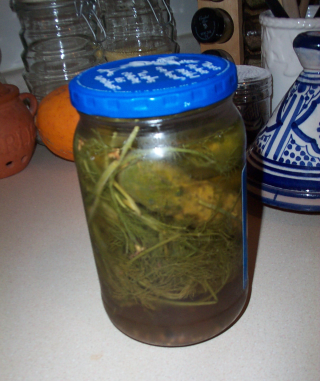A dilly of a pickle

Generally, I'm not much of a home canner. I know that it's a great way to do the whole "eat local" thing through the long, cold winter (see, for instance, this post on Accidental Hedonist), but there's something about the whole process of sterilizing jars, filling them, and sealing them properly that always strikes me as being too much effort. Especially when I lack the space to store large numbers of jars, full or empty.
However, a craving for good kosher dills and a trip to the Dieppe Market a few weeks ago means that I now have my first-ever bottle of homemade dill pickles in the fridge.
The recipe I used comes from Michael Ruhlman and Brian Polcyn's Charcuterie, a book that I can't praise highly enough, even though I've barely scratched the surface of what it has to offer. (To see some of the more impressive projects from the book, check out this thread on eGullet.) In the book, Ruhlman and Polcyn put pickles in the section on brined foods, which I've written about before.
The closest thing I've made to pickles in the past is Moroccan preserved lemons, which I make fairly regularly (and will make more of, once I reclaim my lemon jar from the blueberry-infused vodka that's currently in it). I also tried making some Japanese daikon pickles last winter. They were pretty tasty, but there were only so many I could eat, and my husband didn't have a taste for them, so I ended up disposing of a good part of the jar, something that it pains me immensely to do.
Fortunately, home canning is the one culinary endeavour that seems to be popular in my little corner of the country (as my downstairs neighbour, who very graciously offers me some of his own home-canned pickles and fruit from time to time, will attest). Consequently, supplies for it are quite easily available; it was no trouble finding dill seed, pickling spice or coarse pickling salt, though the fresh dill required a short trip to a neighbouring town.
So how did they taste? Fairly dilly, though I found the pickling spice I used to be a little overpowering, contributing too much allspice flavour to the mix. Next time, I might try making the picking spice mix in the book, rather than using a commercial mix. In a real testament to the quality of the cukes that went into the jar, the pickles were very crunchy and - the biggest surprise - had a distinct cucumber flavour, which is like nothing I've ever tasted in a commercial pickle. In the end, they weren't quite the kosher dill experience I'd been looking for. To get that, I think I'll have to use the recipe for "The Natural Pickle" on page 69 of Charcuterie, which calls for them to be fermented at room temperature (but no more than 23 degrees Celsius) in a 5-per-cent salt solution for 7 days. Or maybe I'll just buy a jar of Strub's.
Oh, and if you recognize it, please ignore the label on my re-purposed jar. Those name-brand kosher dills, while not bad, decidedly did not satisfy my craving for kosher dills, which is why I turned to homemade. Frankly, I found the jar's original contents preternaturally crunchy.
Sorry, no recipe this time. If you really want it, you can find it on page 71 of Charcuterie, which you can get from your local bookstore or library.

2 Comments:
At 9:11 AM, Anonymous said…
Anonymous said…
glad you like the book.
you must try the natural pickle!
At 5:24 PM, Anonymous said…
Anonymous said…
Now you'll have something to eat with your spaghetti on those long cold winter nights... ;)
Post a Comment
<< Home